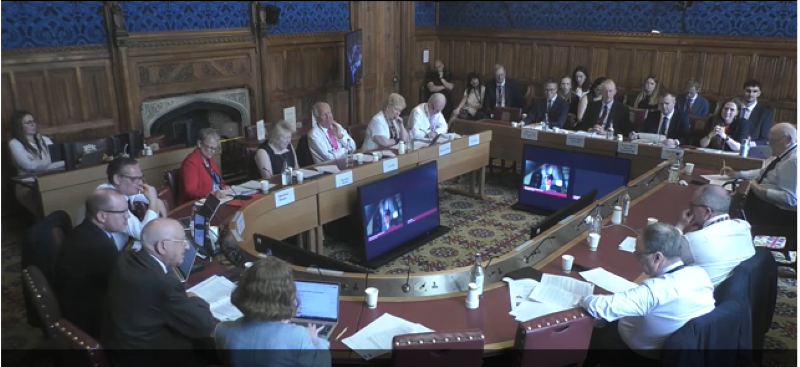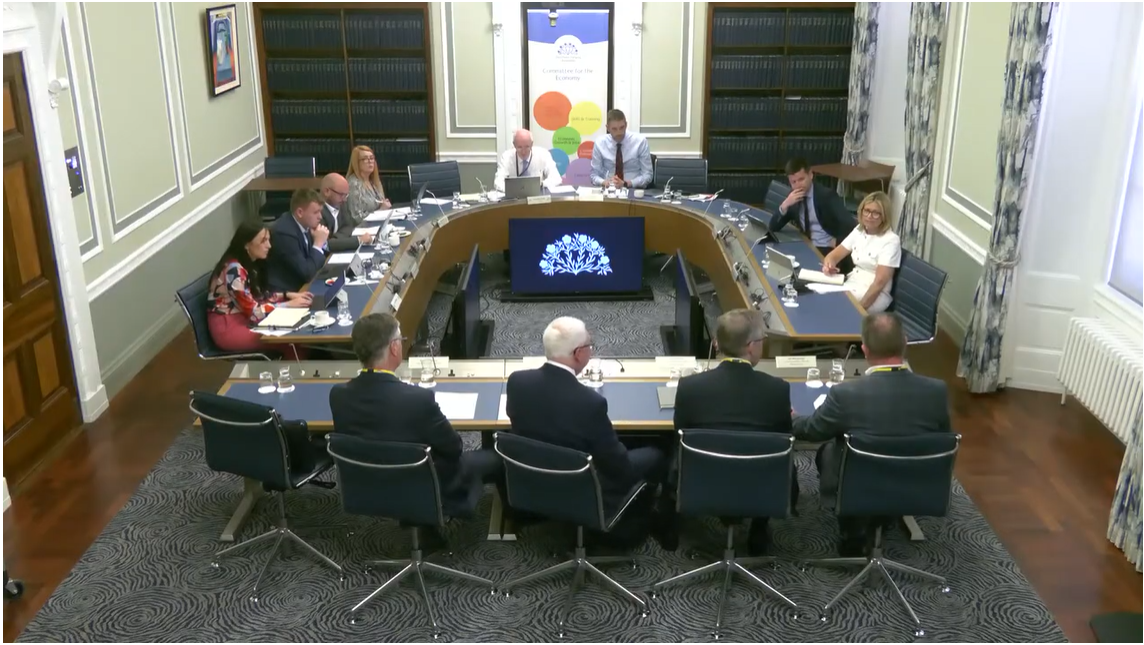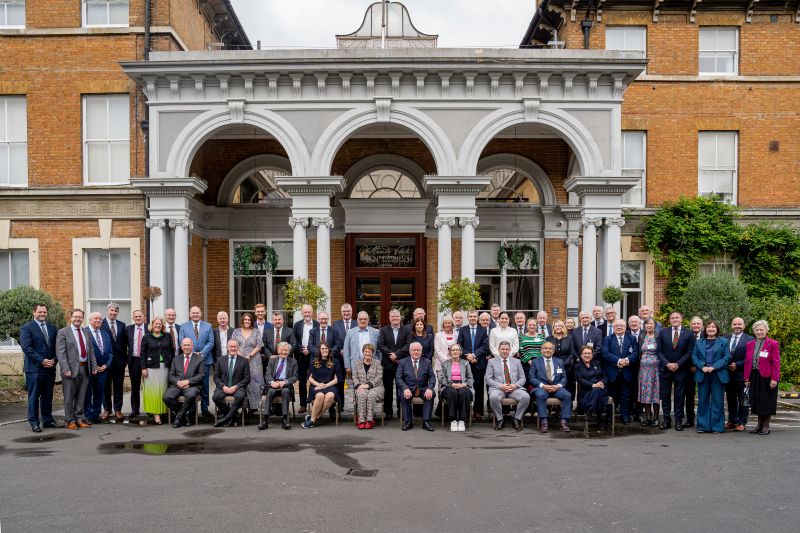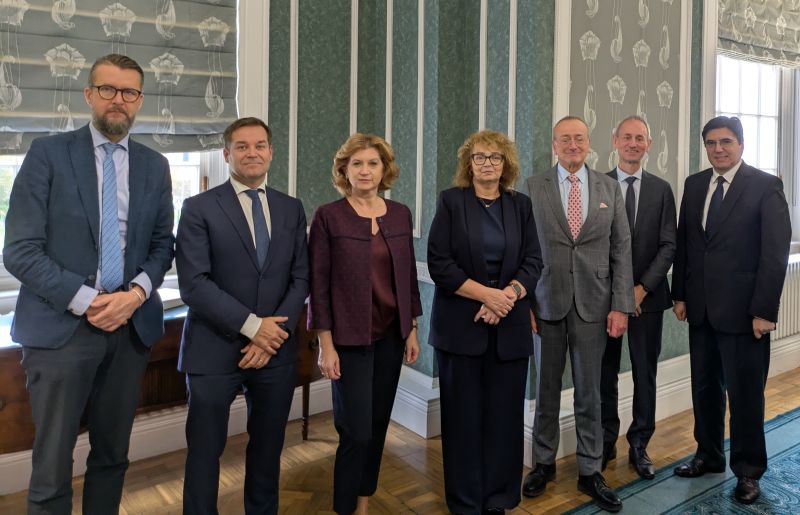Brexit and Beyond
20 October 2025
Welcome to this week's Brexit & Beyond newsletter!
In this week’s bumper edition, we turn the spotlight on the House of Lords with coverage and media commentary on the publication of the Northern Ireland Scrutiny Committee’s report ‘Northern Ireland after Brexit: Strengthening Northern Ireland’s voice in the context of the Windsor Framework’. We also take a look back at the Lords Justice and Home Affairs Committee’s evidence session last week on the launch of the EU’s Entry / Exit System.
Following the British Irish Parliamentary Assembly plenary which took place on the 13 and 14 October, we provide a summary of the discussion topics which included the presentation of its Committee B (European Affairs) report on ‘UK-EU Defence and Security Cooperation Post-Brexit’.
In our Assembly Roundup – we take a look at some of the issues and topics debated and discussed last week in the Assembly and its Committees and look forward to what’s on the agenda this week. As always, we also link through to some of the news stories and items of interest you may have missed.
As always, we appreciate feedback from our readers – so if you have any comments on this edition or have ideas for future content, you can email us at info@brexitandbeyond.niassembly.gov.uk
- Lords Committee Report Warns: ‘Urgent Action Needed to Fix Overwhelmingly Complex Windsor Framework arrangement’
- Lords Committee examines the launch of the EU Entry / Exit System
- Economy Committee Update on the Retail Car Market in Northern Ireland
- British Irish Parliamentary Assembly Holds 67th Plenary in Surrey
- Principal Deputy Speaker Welcomes the EU Ambassador to the UK to Parliament Buildings
- Expressions of Interest Sought for Northern Ireland Business Stakeholders Group
- Assembly Round Up
- This Week in the Assembly
- In case you missed it….
Lords Committee Report Warns: ‘Urgent Action Needed to Fix Overwhelmingly Complex Windsor Framework arrangement’

On Wednesday 15 October, the House of Lords Northern Ireland Scrutiny Committee published its report, ‘Northern Ireland after Brexit: Strengthening Northern Ireland’s voice in the context of the Windsor Framework’. The publication follows an extensive call for evidence in March, after which, the Committee took oral evidence from individuals and bodies, from government, business and academia as well as representations from local political parties and community organisations.
The Committee’s key findings included:
• The UK Government to urgently consider how the institutional architecture of the Windsor Framework can be simplified and made more accessible to Northern Ireland stakeholders.
• The UK Government must address the difficulties businesses are facing due to the absence of a centralised register of applicable EU laws in Northern Ireland.
• More government transparency about the function of the Stormont Brake so that it can be used productively as a mechanism for promoting dialogue between the Northern Ireland Assembly and the UK Government.
• Concerns around the tight timescales for the Windsor Framework Democratic Scrutiny Committee (DSC) to conduct effective scrutiny of the application of new or replacement EU acts to Northern Ireland.
• The Committee also acknowledged the findings of Lord Murphy of Torfaen’s Independent Review and supports several of its key recommendations.
As well as recommending that the UK Government urgently reassesses DSC timescales, the Committee also proposed a new unit within the Cabinet Office responsible for regulatory divergence and a ‘one stop shop’, based on the work of the unit to track divergence. The report suggests the latter element would act as “… somewhere businesses can access relevant information, relating to EU laws which apply in Northern Ireland…”
Speaking after the report’s publication, the Committee Chairperson, Lord Carlile of Berriew said: “We strongly support proposals to enhance Northern Ireland’s voice early in the EU legislative process, including through better resourcing of the UK Mission in Brussels and closer collaboration with the Northern Ireland Civil Service.
"It was clear from the concerns raised by businesses, civil society and political representatives—both in formal evidence and during our visit to Newry and Belfast—that the democratic deficit in Northern Ireland remains unresolved.”
The report has garnered significant local media traction with a number of outlets reflecting reactions from across the political and business spheres. BBC NI spoke to Andrew Lynas of Lynas Foodservice who said: “Brexit paperwork, certificates, staffing, and additional costs from suppliers in Great Britain have led to customers paying more” adding he "doesn't want and doesn't like it". Mr. Lynas continued: “…the additional cost that suppliers, particularly in Great Britain, put on businesses had passed through to the customer.”
The article quotes Democratic Unionist Party (DUP) peer Lord Dodds, who said: "Every day that this situation is allowed to persist further erodes Northern Ireland's constitutional position, harms consumer choice, and imposes unnecessary costs and burdens on businesses." Meanwhile the First Minister, Michelle O’Neill MLA stated that: “…the post-Brexit reality meant that there has to be special arrangements, that come in the form of what is now the Windsor Framework.” She added that: “There are some issues that need to be resolved, but there just needs to be some pragmatism around ironing out the kinks that are there.”
Business Eye, a local business magazine spoke to the Federation of Small Businesses (FSB) Chair Alan Lowry, (the FSB provided evidence to the inquiry), who said that the FSB: “…wholeheartedly endorse the Committee’s call for increased simplification and accessibility of the Windsor Framework structures, the creation of a ‘one stop shop’ to track divergence and provide information to businesses, and a revamp of the Trader Support Service.”
The full report which includes links to the Committee evidence sessions and a list of all evidence gathered can be accessed here.
Lords Committee examines the launch of the EU Entry / Exit System

In what was a busy week in the House of Lords for Windsor Framework and EU related matters, the Committee for Justice and Home Affairs Committee took evidence last Tuesday on the launch of the EU’s Entry / Exit System. Joining the Committee to discuss initial impressions and impact of the EES launch were the travel journalist and broadcaster Simon Calder, Niovi Vavoula, Associate Professor and Chair in Cyber Policy at the University of Luxembourg and Simon Lejeune, Chief Safety and Stations Officer at Eurostar.
Opening the Session, Simon Calder told the Committee that he had “…taken a midnight plane to Prague…” on the launch date to test out the new system. He explained that while all EU Member States within the Schengen area are required to comply with the EES system, each state can decide its own format and put in place its own requirements. He gave an example of the Czech Republic requiring fingerprints from both hands while Eurostar requires only four fingerprints from the right hand. He noted that it was this aspect, alongside the list of questions specific to this particular member state, that he felt slowed things down and led to “…quite significant queues building up.” Mr. Calder said that he had timed the process and it had taken a total of 2 minutes and 26 seconds.
Simon Lejeune told the Committee that Eurostar had invested £10 million in providing the necessary infrastructure, this included the installation of 49 kiosks for pre-registration at the French Border in St. Pancreas Station, 24 of which were provided by the French Interior Ministry and a further 25 put in place and financed by Eurostar. He added that Eurostar had developed a number of digital tools, including a checklist for passengers. Mr. Lejeune said that the learnings so far had been quite positive, he noted that they had processed approximately 550 passengers on Monday, which included the capturing of biometrics and that the processing times had taken around 50 seconds. He added that the processing had been completed outside of the kiosks which will be operational within the next few weeks.
Professor Vavoula in her opening remarks said that she found divergence in the application of the rules ‘alarming.’ She noted that “…the EES Regulation is adamant and very explicitly states that a facial image and four finger [prints] must be recorded in the Entry/Exit System.” She added that the capturing of “…10 fingerprints was discarded during the legislative process, precisely in order to reduce the queuing times”. In reference to the questions asked by different Member States, she noted that border control authorities are “…a little more flexible…” as the questions are “…not laid down in the EES regulation.”
Committee Members were keen to explore issues around a progressive rollout of the EU’s Frontex app, that would allow non-EU travellers to pre-register their travel document data and facial image. Further questions centred around whether or not the cost of EES delays and necessary infrastructure had been passed on to the consumer and if the UK government had adequately communicated how the new EES system will impact its citizens. You can watch the full Committee session here.
Economy Committee Update on the Retail Car Market in Northern Ireland

At its last meeting before summer recess, the Committee for the Economy took evidence from the National Franchised Dealer Association (NFDA) on EU regulations vehicle emissions.
Opening the discussion NFDA representative, Alastair Peoples outlined that from January 2026, GB National ‘Type Approval’ new cars will no longer be able to be registered in Northern Ireland. He warned that this meant that consumers here will have: “…less choice and will have to pay more tax on cars than consumers in GB.” He also cautioned that the local automotive sector which employs around 17,500 people will: “… take a big financial hit with subsequent job losses.”
Dave Sheeran from Donnelly Group explained to the Committee that ‘Type Approval’ is the standards to which vehicles are tested in relation to safety and environmental requirements, before they can be placed on the market. He noted that pre-Brexit this wasn’t an issue as all UK vehicles were subject to EU ‘Type Approval’.
Mr Sheeran asked the Committee to support a call from the NFDA “…to allow GB national ‘Type Approval’ to apply in the short term and become a longer term legislative fix to the problem.” You can watch that Evidence Session here.
Following the meeting, the Committee wrote to the Secretary of State for Northern Ireland stating that it was: “…unanimous and unequivocal in its view that a simple extension to the existing derogation should be applied so that both European Community Whole Type Approval (ECWVTA) and GB Whole Type Approval (GBWVTA)-registered new cars etc. can continue to be sold in Northern Ireland.”
In his response to the Committee, the Secretary of State noted that the Government had recently written to vehicle manufacturers to confirm that he intended to align requirements and ensure consistency between the GB and EU type approval schemes.
With regards to the EU Emissions Standards that are due to come into effect in Northern Ireland in 2026, the Secretary of State said: “…that the Government had announced its intention to mitigate the increase in Benefit-in-Kind taxation in the event that the new emissions standard for plug-in hybrid electric vehicles (PHEVs) is introduced in Great Britain.” He added that the Department for Transport will also consult on introducing the Euro 6e emissions standard for cars and vans in Great Britain from April 2026. Subject to the consultation outcomes, he said that: “...the Government intends to legislate for an easement that will apply UK-wide between April 2026 and April 2028 to address this taxation issue. This would also apply in Northern Ireland retrospectively to January 2025 in order to ensure consistency across the UK.”
The Economy Committee said that it welcomed the commitment to protecting Northern Ireland’s place within the UK internal market and the helpful clarity that all of Northern Ireland’s consumers will have access to the same vehicles and models available as in Great Britain. It also welcomed the undertaking from the UKG to work with UK car manufacturers so as to ensure that the revised car registration system works for all parts of the UK.
The Committee further noted that the Department for Transport is consulting on the introduction of the Euro 6e emissions standard for cars and vans in Great Britain from April 2026 and that subject to the consultation outcomes, the UK Government is to legislate for an easement. This will apply UK-wide between April 2026 and April 2028 to address taxation issues and would apply in Northern Ireland retrospectively from January 2025.
While cautiously welcoming the updated information, Members did agree to seek further clarity on the timeline for: the alignment of GB and EU type approval schemes; the DfT consultation on Euro 6e emissions; and the application of the taxation easement for Northern Ireland.
British Irish Parliamentary Assembly Holds 67th Plenary in Surrey

Weybridge, Surrey was the destination for the 67th British Irish Parliamentary Assembly (BIPA) which took place on the 13 and 14 October. The BIPA plenary is attended by political representatives from the UK Government, the Scottish Parliament, Senedd Cymru, the High Court of Tynwald and the States of Guernsey and Jersey, the Oireachtas and the Northern Ireland Assembly.
Last week’s session opened with a key note address from HE Kara Owen CMG, Ambassador-designate of the United Kingdom to Ireland and HE Martin Fraser, Ambassador of Ireland to Great Britain on ‘Developing the Bilateral Relationship’. This was followed by an address from James Lawless TD, Minister for Further and Higher Education, Research, Innovation and Science on ‘UK–Ireland 2030: Developing Research, Innovation and Skills’.
Closing out day one of the plenary, Darren Millar MS presented BIPAs Committee B (European Affairs) report on ‘UK-EU Defence and Security Cooperation Post-Brexit’. This is the final report of a Committee inquiry which was launched in 2018 and follows security and defence agreements concluded between the UK and Ireland in March and between the UK and EU in May. The Committee notes that it expects that the agreements will result in a more collaborative approach to security and defence.
Recommendations within the Report include:
• That the UK and Ireland establish a joint statutory Cables Protection Commission to protect and monitor communication cables, gas pipelines and other maritime infrastructure.
• That Governments in all BIPA jurisdictions should urgently update their legacy IT systems and intensively share information and best practice to ensure the highest possible levels of cyber security.
• The report recognises the significant impact of irregular migration to the EU on security and recommends improvements in cooperation when it comes to intelligence sharing and countermeasures.
Speaking after the report launch, the Committee Chair Darren Millar MS said: “The security landscape has shifted dramatically since the start of our inquiry in 2018 and the recent agreements between the UK and Ireland and the EU are a welcome response to the ever-changing threats that we face.” He concluded: “We urge governments to act decisively on our recommendations to strengthen collective security and build on the progress we have already made.” The report in full is available here.
Day 2 of the plenary focussed on progress reports from the BIPA Steering Committee and the Committees on Security; Justice and Global Issues; Climate, Energy, Science and Technology; Growth, Trade and Investment and the Committee on Peoples and Cultures.
Participants also debated a motion moved by the Steering Committee on the ‘Proposed Joint Framework on the Legacy of the Troubles’.
You can find out more about the background, work and remit of BIPA here.
Principal Deputy Speaker Welcomes the EU Ambassador to the UK to Parliament Buildings
H.E. Pedro Serrano, the EU Ambassador to the UK is pictured third from right.
Last Tuesday, the Assembly’s Principal Deputy Speaker Carál Ní Chuilín MLA met with H.E. Pedro Serrano, the EU Ambassador to the UK. The EU Ambassador was joined by a delegation of senior diplomats including the Ambassadors of Romania, Belgium, Bulgaria, Estonia, and Finland.
Expressions of Interest Sought for Northern Ireland Business Stakeholders Group
Last week the UK Government announced that it was inviting expressions of interest from the local business community to join a new, self-standing Northern Ireland Business Stakeholders Group on the Windsor Framework (NIBSG).
A Cabinet Office update issued on 13 October underlined that: “…the group will participate in engagements with the UK Government to provide crucial feedback from the NI business community on the Windsor Framework and how the benefits of the new SPS Agreement with the EU will flow to NI.
“Additionally, the UK Government will then recommend to the European Commission to invite this group to attend joint UK-EU engagements on the implementation of the Windsor Framework, including potential visits to Brussels.”
Further information on background, eligibility and membership expectations are available here and the deadline for receipt of applications is October 31 2025.
Assembly Round Up

In response to a question last Monday regarding the equitable distribution of the ‘Shaping Sustainable Places’ budget, the Minister of Agriculture, Environment, and Rural Affairs, Andrew Muir told the Assembly that his department had previously: “… supported regeneration activities in rural settlements with a population of 5,000 and below on behalf of the Northern Ireland Executive through successive European Union rural development programmes.” He stated that it was his intention to propose that his Department would invest £50 million into the £150 million fund and that it would be “…earmarked for spend to support regeneration activities in rural settlements with populations of 5,000 and below to ensure that no rural community is left behind.”
Regarding collaborative working in a bid to eradicate Bovine TB, the Minister told Members that he had been pleased to announce on Friday 10 October that: “…alongside Minister Heydon, a new cross-border project as part of the Shared Island initiative to tackle the growing impact of bTB on farms in a pilot area. That new cross-border initiative is aimed at taking a regionalised approach to tackling bovine TB.”
On Thursday, the Committee for Agriculture, Environment and Rural Affairs received a briefing from Departmental Officials on the Air Quality Common Framework, a UK-wide framework established after Brexit to coordinate air quality policy across the UK, including Northern Ireland. You can watch the full evidence session here:
This Week in the Assembly
Today, during Assembly Question Time, the Executive Office is expected to respond to questions on: the development of a Europe strategy; local councils response in relation to its work on the International Relations Strategy; an update on work undertaken by the Department under the auspices of the North South Ministerial Council and on how their Department is leading the Executive in attracting large-scale inward investment to Northern Ireland.
On Tuesday, a Private Members Motion on the Local Growth Fund proposes that: “…this Assembly recognises the positive impact that the European Regional Development Fund and the European Social Fund have had in supporting the community and voluntary sector." It further calls on: “the British Government to fulfil its promise to match European Union funding in full and to provide clarity for the community and voluntary sectors beyond 2026.” You can read the full text of the motion here:
Officials from the Executive Office will brief the Committee for the Executive Office on the ‘Programme for Government Delivery’ on Wednesday.
As always you can watch all Assembly plenary debates and Committee meetings live or catch-up via niassembly.tv
In case you missed it….

• On Wednesday, 22 October the Northern Ireland Affairs Committee will take evidence on its inquiry into the operation of the Windsor Framework from The Rt Hon. the Lord Murphy of Torfaen, the Rt Hon Hilary Benn MP, Secretary of State for Northern Ireland and the Rt Hon Nick Thomas-Symonds MP, Paymaster General and Minister at Cabinet Office. The session can be viewed live from 9:30am here
• The Ulster Farmers Union has published its October 2025 policy report which includes updates and positions on a number of EU related issues, including: EU Animal Welfare Laws, the Windsor Framework and a Parliamentary update.
• The Scottish Parliament Information Centre (SPICe) has published a new blog on the European Union’s new Entry/Exit System (EES).
• The Vet Times reports that Animal Health Distributors Association (AHDA) has warned that ‘NI medicine plans ‘failing’ animals’.
• The Belfast Telegraph reported on Thursday that: ‘Post-Brexit deal could prevent Starmer’s smoking ban being introduced in NI’.
• The Independent and other media sources report that the King will host a German State Visit in December, this will be the first state visit by a German President in over 25 years.





